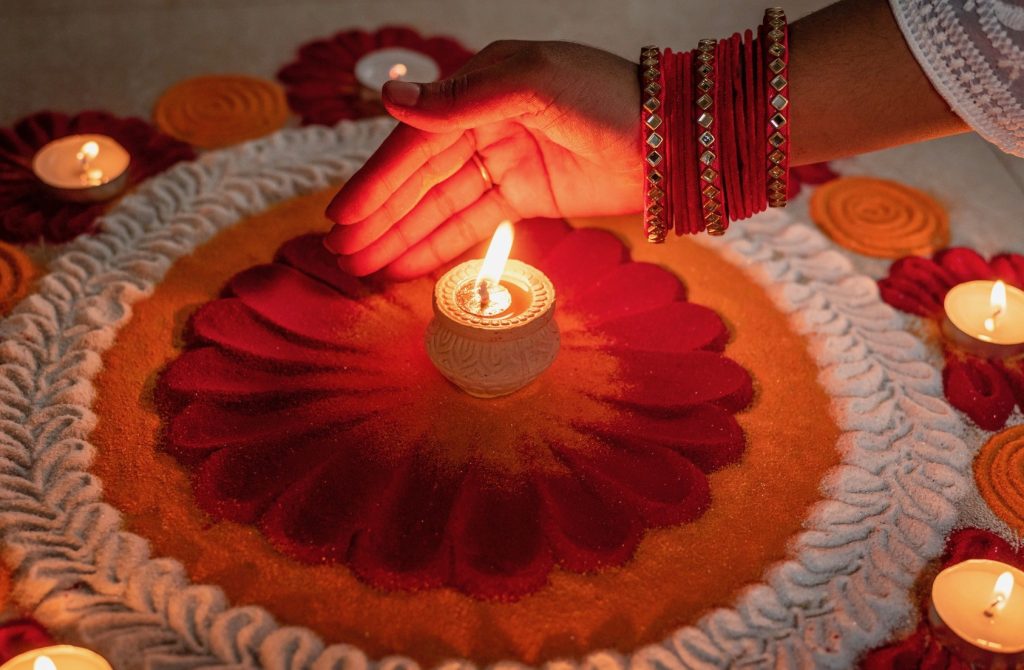What is Diwali?
Diwali’s literal meaning is “a row of lights,” and it is celebrated by lighting oil lamps (called diyas) or candles to symbolize the victory of light over darkness. The exact traditions and stories behind Diwali vary across regions and faiths, but its central theme is the celebration of hope, renewal, and positivity.
Why is Diwali Celebrated?
The reasons for celebrating Diwali differ based on cultural and regional traditions, but these are the most widely known stories:
- Return of Lord Rama to Ayodhya (Hindu Tradition): One of the most famous stories associated with Diwali is the return of Lord Rama to his kingdom Ayodhya after 14 years of exile and his victory over the demon king Ravana. The people of Ayodhya lit rows of oil lamps to celebrate his homecoming, marking the triumph of good over evil.
- The Victory of Lord Krishna Over Narakasura: In some parts of India, Diwali celebrates Lord Krishna’s victory over the demon Narakasura, symbolizing the victory of divine forces over evil forces.
- Worship of Goddess Lakshmi (Hindu Tradition): Diwali is also considered a time to worship Goddess Lakshmi, the goddess of wealth and prosperity. It is believed that on Diwali night, she visits homes to bless them with wealth, peace, and happiness. This is why many people clean and decorate their houses, hoping to welcome her blessings.
- Sikh Tradition (Bandi Chhor Divas): For Sikhs, Diwali coincides with Bandi Chhor Divas, which celebrates the release of Guru Hargobind from imprisonment by the Mughal Emperor Jahangir. Sikhs light lamps and celebrate the release of their leader and the spirit of freedom.
- Jain Tradition: Diwali is important for Jains as it marks the day when Lord Mahavira, the last of the 24 Tirthankaras (spiritual teachers), attained nirvana (spiritual enlightenment).
- New Year Celebration: In some regions of India, Diwali is celebrated as the beginning of the Hindu New Year. Businesspeople close their books for the year, perform religious ceremonies, and pray for success in the coming year.
Importance of Diwali as a Community
Diwali has deep cultural and spiritual significance, and its celebration strengthens the bonds within families, communities, and societies at large. Here’s why Diwali is important to the community as a whole:
- Unity and Inclusivity: Diwali transcends religious and cultural boundaries, making it an inclusive festival celebrated by Hindus, Sikhs, Jains, and Buddhists alike. It serves as a reminder of the shared values of love, peace, and mutual respect. It also brings people together, regardless of their faith, as communities gather for festive meals, prayers, and socialising.
- Strengthening Family and Social Ties: Diwali is traditionally a time for family reunions and gatherings. Families clean and decorate their homes, prepare sweets and festive meals, exchange gifts, and come together for prayer and celebration. This strengthens familial bonds and fosters a sense of community well-being.
- Celebration of Hope and Renewal: Diwali symbolises a fresh start and new beginnings. The festival encourages individuals and communities to let go of negativity and past grievances, embrace positive change, and look forward to a brighter future. Lighting lamps and bursting fireworks are seen as acts of dispelling darkness and evil, bringing hope and prosperity to all.
- Acts of Charity and Compassion: During Diwali, many people engage in charitable acts and service to the less fortunate. Communities organise food and clothing drives, and families often donate to those in need. This emphasis on charity and sharing makes Diwali a time of collective goodwill.
- Economic Importance: Diwali plays a crucial role in boosting the economy, particularly in India. It is a time for new purchases, from clothes to gold to electronics, and marks the beginning of the festive shopping season. Markets come alive with people buying decorations, sweets, and gifts, helping small businesses and artisans thrive. The economic activity during Diwali positively impacts the entire community.
- Cultural Preservation: Diwali’s rituals and customs help preserve cultural identity, especially for those living in diaspora communities. Celebrating Diwali in different parts of the world allows people to reconnect with their heritage, pass down traditions to younger generations, and celebrate the richness of their culture within a broader multicultural context.
Diwali’s Message to the World
Diwali’s message of hope, light, and unity has universal appeal. It reminds everyone of the importance of goodness, compassion, and resilience in overcoming life’s challenges. As communities gather to celebrate, it strengthens the idea that collective well-being, mutual respect, and kindness are essential for a harmonious society.
In summary, Diwali is much more than just a religious festival. It is a time for reflection, togetherness, and renewal, reinforcing shared human values. Its celebration as a community brings people together, fosters social unity, and offers an opportunity for hope and new beginnings, making it an occasion of immense significance for people all over the world.

